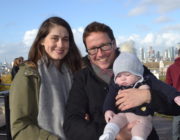Thursday, 23rd May 10:15pm, RTÉ One
Can Irish Deaf people work as fashion designers, construction managers and accountants at the top of their game? Yes. If they move to London.
Even though there are plenty of jobs in Ireland in their field, how many employers are willing to hire someone who’s Deaf and communicates in sign language?
London Calling is the story of 5 Irish Deaf people who are unemployable in Ireland and have moved to the UK, where their deafness is not an issue for employers. While some have settled there, others long to return home to their families. Their choice is between a successful career in London or a disability payment or dole queue in Ireland.
If Irish Deaf people want use the third official language of Ireland, Irish Sign Language, at work, they have to move to the UK to do it. For the London Irish, the major boost to their employability is the UK’s “Access to Work” fund that ensures people with disabilities have full access to employment. They can access up to £57,000 a year to pay to have a sign language interpreter in work with them every day. There is no comparable scheme in Ireland.
Sharon Osborne from Wexford has forged a successful career as a fashion designer, with designs sold by ASOS, Boohoo, Nasty Gal and Warehouse, but in Ireland, she struggled to access third level education.
Thomas Mulloy from Dublin is working as chief accountant in London. He manages a hearing team and uses sign language interpreters to communicate with them. At age 12, Tom’s parents, who are also Deaf, felt the education system for Deaf children in Ireland wasn’t up to scratch and he moved to a Deaf boarding school in England. He settled in the UK, and he and his wife recently had a baby girl. When she was born Deaf it cemented their plan to stay in the UK so they could be sure of a bright future for their daughter.
Eoin Burns was born to a hearing family in Cork and graduated CIT and UCC with engineering and construction degrees and a Masters in Town Planning. Despite being highly educated, he couldn’t find work in Ireland and had to argue with employers that having a Deaf man on a construction site wouldn’t be dangerous. He moved to the UK, found work and has been promoted 3 times in 5 years.
Emma Nolan moved to London a year ago, when she tired of Irish employers turning her down for every job she applied for. She was pleasantly surprised when retailer H&M offered her a job and provided her with a pager to translate the information other staff were getting over their radios into text, sign language interpreters formeetings and she was quickly promoted to team leader. Having spent a year in London, she says Ireland feels like it’s 20 years behind.
“London Calling’ follows four Irish Deaf people already living and working in the UK and Joanne Chester, from Waterford who is struggling to find work as a youth worker in Ireland and actively considering a move to the UK. Passionate about her field, Joanne feels that if she’d had some youth intervention she would have had more direction in her own life when she was young. Her limited career prospects and a feeling that her potential wasn’t being recognised led to a period of deep struggle with her mental health. We see Joanne arrive in London to meet youth workers who are making a real difference in the lives of the Deaf youth they work with. Joanne has a tough decision to make, will she stay in Ireland and try to improve things here, or go to the UK in pursuit of her dream job?
For generations Irish people have been emigrating in search of a better life. “Access emigration” is the latest chapter in the Irish emigration story as a new brain drain sees highly qualified, ambitious and intelligent young Irish people moving abroad to gain access to education and employment that should be available at home.
“London Calling” is the latest documentary exploring the experiences of Irish Deaf people by Sundance nominated Director, Garry Keane and award-winning producer, Anne Heffernan, for Mind the Gap Films.
London Calling – Thursday, 23rd May 10:15pm, RTÉ One











